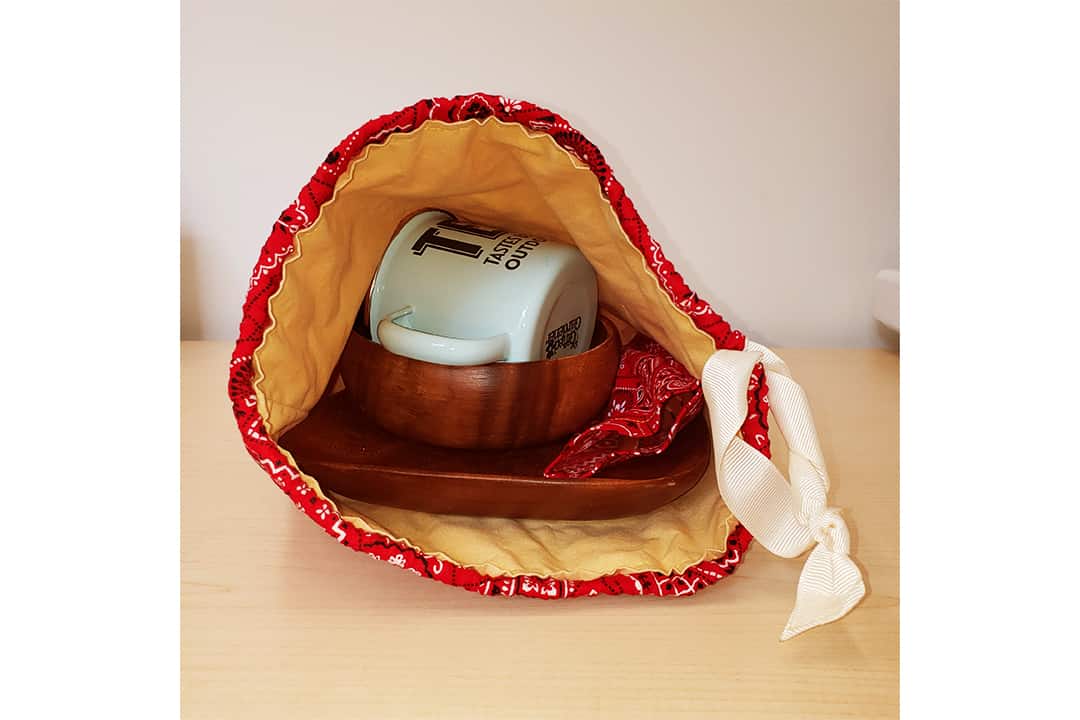On May 18, the Indigenous Studies Students’ Union (ISSU) and First Nations House (FNH) co-hosted a feast bundle making workshop in the event space at the First Nations House, which is located in the North Borden Building.
A feast bundle is a bag you use to bring your own plate, bowl, and utensils to a feast. A feast bundle is a bag that you bring with you to feasts to hold you accountable for yourself when you attend other peoples’ ceremonies and feasts.
I attended the workshop and had the privilege of making my own feast bundle bag with the help of Jenny Blackbird, the Indigenous student life coordinator and in-house seamstress. I am now able to attend feasts prepared with my own bundle, reducing the waste I would have accumulated without my bundle.
As a Black Anishinaabe woman from Kinistin Saulteaux Nation, I found that the workshop was not only fun to attend, but it also allowed me to make something sustainable and practical that I could use when attending ceremonies and feasts both within and outside the University of Toronto. The feast bundle workshop made me think more about the environmental benefits of having a bag, as well as the responsibilities one has to Mother Earth and community.
Environmental benefits
While living under ongoing structures of settler colonialism on Turtle Island, it is more common than not to come into contact with single-use items, like plastic and styrofoam utensils, that create waste and pollution. These items end up in our waterways and landfills, and consequently foster antagonistic ways of being in relation to Mother Earth that do not correspond to the ways Indigenous nations have always been responsible for taking care of the land and continue to live with and on the land.
Because of the feast bundle workshop, I will be able to attend feasts knowing I am creating less waste, which is one more step in the direction of living in a reciprocal relationship with Mother Earth. The feast bundles that we made at FNH are made out of fabrics that are machine washable, so the bags are reusable even if they get dirty after attending a few feasts.
Personal responsibilities
Additionally, the workshop also prepares you to uphold your different responsibilities when attending ceremonies where a feast happens. When you attend a ceremony, you are responsible for the gifts and protocols that you need to follow through on. By creating and maintaining your own feast bundle bag, whether that be by keeping your bag clean or repairing any rips, you are already taking responsibility for yourself and not expecting others to provide for you.
While the feast bundle workshop was practical, it is not the only event that FNH or the ISSU holds during the academic year; both organizations hold and facilitate many different events for students, staff, and faculty to attend. Their events are a really good way for urban Indigenous students to find a sense of community while attending the University of Toronto. The events are not Indigenous exclusive and are also for non-Indigenous peoples.
For an urban and/or dispossessed Indigenous person attending the University of Toronto, these events create spaces where Indigenous epistemologies are at the forefront of the teachings. I also think the events are great because Indigenous epistemologies are not only being engaged with as historical, abstract, or academic matters. Through gatherings, these spaces and events offer a strong sense of community in which I hope more people can continue to participate.
Even non-Indigenous peoples, who may be either intimidated or shy but want to learn more about Indigenous cultures beyond academic or historical frameworks, should respectfully attend these different events. I look forward to continuing to attend events like the feast bundle workshops in the future, and I look forward to seeing new faces!


